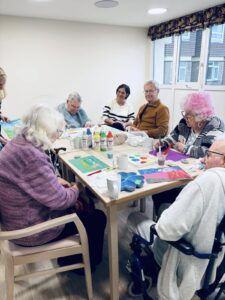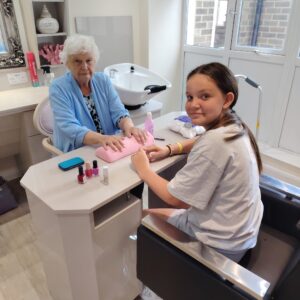Imagine stepping into a world where your well-being is a top priority, and each day brings opportunities for growth and companionship. Residential care facilities offer a unique blend of support and resources that can significantly impact the mental health of elderly individuals.
Through a combination of holistic care practices and tailored interventions, these spaces provide a nurturing environment that fosters emotional stability and overall wellness. But how exactly do these facilities achieve such positive outcomes, and what are the specific ways in which they contribute to enhancing the mental well-being of their residents?
Key Takeaways
- Community and social support combat loneliness and promote emotional well-being.
- Professional care services offer tailored support and crisis intervention for mental health.
- Opportunities for social engagement reduce isolation and enhance mental well-being.
- Personalized care plans and autonomy promotion enhance quality of life for the elderly.
Sense of Community
In residential care for elderly mental health, fostering a sense of community among residents can significantly enhance emotional well-being and overall quality of life. Creating a supportive environment where individuals feel connected and valued is crucial in promoting mental wellness. Encouraging social interactions, group activities, and shared meals can help combat feelings of loneliness and isolation that are common among the elderly.
By establishing a sense of belonging and camaraderie, residents are more likely to experience improved mood, increased self-esteem, and a sense of purpose. Engaging in meaningful relationships with peers and staff members can provide emotional support, reduce stress, and boost resilience in the face of challenges. Being part of a community allows individuals to share experiences, offer mutual encouragement, and celebrate each other’s achievements.
Through fostering a sense of community, residential care facilities can create a nurturing environment where elderly residents feel supported, understood, and connected. Building relationships and social connections can lead to a more fulfilling and enriching life during the later stages of adulthood.
Access to Professional Support
Accessing professional support services is essential for ensuring the mental health and well-being of elderly residents in residential care facilities. Having access to knowledgeable professionals such as therapists, counselors, and psychologists can provide crucial emotional support and guidance for residents facing various challenges. These professionals can offer individualized care plans tailored to each resident’s unique needs, whether they’re coping with grief, managing chronic illnesses, or simply seeking someone to talk to.
Professional support services also play a vital role in monitoring and managing mental health conditions such as depression, anxiety, and cognitive decline. Through regular assessments and therapy sessions, professionals can help residents navigate their emotions, develop coping strategies, and enhance their overall quality of life. Additionally, having access to psychiatric services allows for timely intervention in case of any mental health crises or changes in behavior.
Opportunities for Social Engagement
To foster a sense of community and well-being among elderly residents in residential care facilities, providing opportunities for social engagement is paramount. Social activities such as group outings to local attractions, game nights, arts and crafts sessions, and exercise classes can help residents connect with their peers, reduce feelings of isolation, and boost overall mental well-being. These engagements create a supportive environment where residents can interact, share experiences, and build friendships, leading to a sense of belonging and purpose.
Additionally, scheduled events like holiday celebrations, themed parties, and movie nights offer residents a chance to participate in shared experiences, fostering a sense of camaraderie and joy. Encouraging residents to join clubs or interest groups based on hobbies or pastimes can further enhance their social interactions and provide a sense of fulfillment.
Personalized Care Plans
Crafting personalized care plans tailored to each resident’s unique needs and preferences is essential in ensuring their well-being and comfort in residential care for elderly mental health. By customizing care plans, you can address individual requirements effectively, promoting a sense of security and enhancing overall mental health outcomes.
Importance of Personalized Care Plans:
- Individualized Attention: Tailoring care plans allows for personalized attention to specific needs, fostering a deeper connection between residents and caregivers.
- Promoting Autonomy: Creating personalized care plans empowers residents by involving them in decisions about their care, promoting a sense of control and independence.
- Enhanced Quality of Life: Personalized care plans aim to improve the quality of life for residents by addressing their unique preferences, interests, and health requirements.
Crafting these tailored care plans requires understanding and compassion to provide the best support for elderly residents in their mental health journey.
Safe and Structured Living Environment
Ensuring a safe and structured living environment is paramount for the well-being and security of elderly individuals in residential care for mental health. By providing a safe space, you can feel at ease and focus on your mental health journey without unnecessary worries. Structured routines and environments help create a sense of stability, promoting a comforting atmosphere where you can thrive.
Safety measures such as handrails, non-slip flooring, and adequate lighting are put in place to prevent accidents and ensure your physical well-being. Emergency call systems are readily available to provide immediate assistance if needed, offering peace of mind and a sense of security.
Having a structured daily schedule that includes activities, therapy sessions, meals, and social interactions can help you feel organized and engaged. This predictability fosters a sense of control and routine, which are essential for mental health stability.
In this environment, you’re supported in every aspect of your daily life, promoting a sense of belonging and care that contributes significantly to your overall mental well-being.
Frequently Asked Questions
How Does Residential Care for the Elderly Address the Individual’s Spiritual and Emotional Needs?
In residential care for the elderly, addressing spiritual and emotional needs is crucial. Staff provide compassionate support, fostering a sense of belonging and purpose. Through activities, therapy, and personalized care, individuals find comfort and connection, enhancing their overall well-being.
Are There Specific Programs or Activities in Place to Promote Cognitive Stimulation and Mental Wellness Among Residents?
You’ll find a variety of programs tailored for cognitive stimulation. Engage in brain games, art therapy, or music sessions. These activities not only boost mental wellness but also foster a sense of community and purpose.
How Do Residential Care Facilities Ensure a Sense of Independence and Autonomy for Elderly Residents?
In residential care, fostering independence and autonomy for elderly residents is crucial. Staff provide support while encouraging self-reliance in daily tasks, decision-making, and personal choices. This empowerment enhances quality of life and preserves dignity for residents.
What Measures Are Taken to Address the Mental Health Needs of Residents With Specific Conditions Such as Dementia or Depression?
When addressing mental health needs like dementia or depression in residential care, staff provide personalized care plans, therapy sessions, medication management, and activities tailored to each resident’s condition. Your well-being and comfort are top priorities.
How Do Residential Care Facilities Support Family Involvement in the Care and Wellbeing of Their Elderly Loved Ones?
In residential care facilities, you are encouraged to be actively involved in the care and wellbeing of your elderly loved ones. Staff facilitate open communication, provide support, and welcome your participation in decision-making to ensure their comfort and happiness.
Conclusion
In conclusion, residential care facilities provide a warm embrace for elderly individuals, like a cozy blanket on a chilly night. With a sense of community, access to professional support, social engagement opportunities, personalized care plans, and a safe living environment, these facilities offer a nurturing environment for mental health.
So, if you or a loved one are in need of care, remember that residential care can be a comforting haven where hearts are cared for like delicate flowers in a garden.






